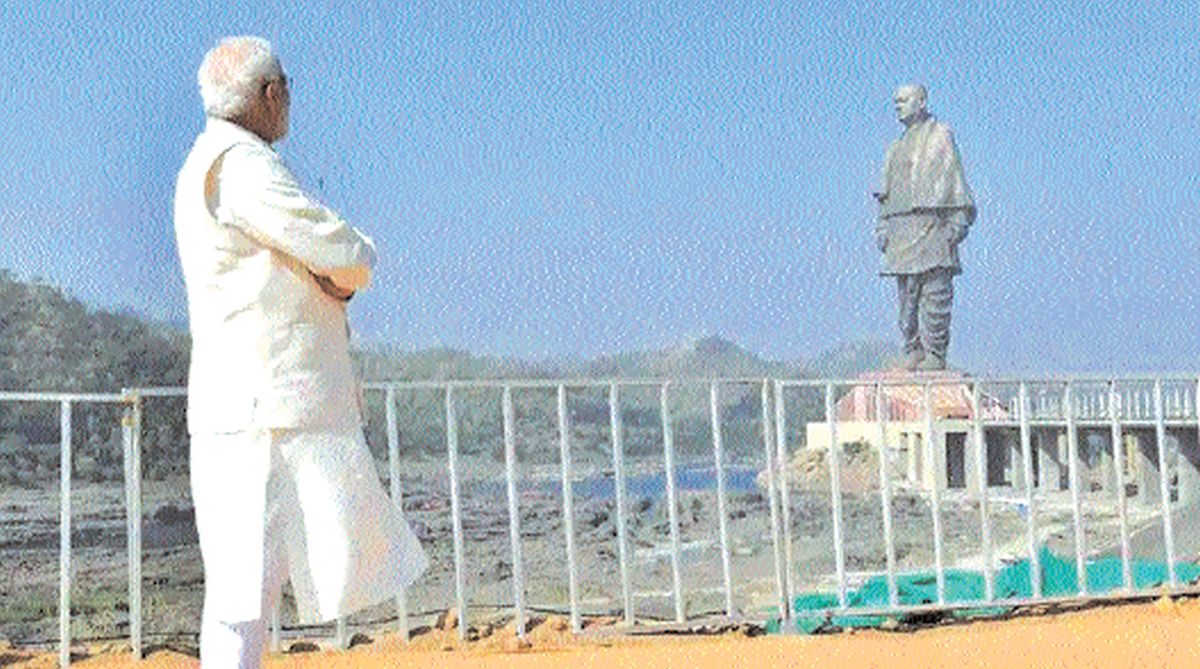Prime Minister Narendra Modi inaugurated a 182-meter marvel named the Statue of Unity in honour of Sardar Vallabh Bhai Patel. The tallest statue in the world has been able to garner controversy proportionate to its size and grandeur. Beyond criticism on account of resources and appropriation of history in the name of Patel, this statue offers an opportunity for all of us to reflect on a phenomenon that is plaguing our democracies – idolizing political leaders.
Sardar Patel for his ‘holy work of thwarting the conspiracy to disintegrate Mother India into pieces’ stands as the symbol of unity and the statue reaffirms the fact that India owes its territorial unity single-handedly to Sardar Patel. Certainly, his work and leadership were instrumental in bringing over 550 princely states together as one sovereign state. Perhaps, without his foresight and tact, unification of the country might have taken an absolutely different route.
Advertisement
However, in making his name synonymous with the unity of independent India we are essentially defeating the underlying principle that drove his vociferous negotiations with princely states – that every little unit matters. In worshipping Patel for his leadership, we undermine the force of the collective will of the princely states which decided to join the Dominion of India, the overall spirit of nationalism exhibited by the population and the relentless efforts of his team.
He, like all other leaders we end up worshipping, was doing his job as a tactful statesman. The leader is not an entity independent of the political support of the people he or she leads. The moment we idolise the leader alone, we are disassociating the leader from the masses. Such disassociation leads to a fake sense of reality, both for the leader and for the masses.
This is not the first or the last time that we as a nation have idolised political leaders. From national movements to the nation-state, we have always been looking to be led by a charismatic personality. This is an undesirable feature of most democratic set-ups in the world. Overarching personalities become the symbol of the principles, values or issues of the system. We make real issues take refuge in personalities, we prioritize people over institutions. We place insurmountable faith in their capabilities and reason more than the institutions which they are mandated to lead. This kind of symbolic politics can be called into question for multiple reasons.
Firstly, this places tremendous amounts of power in the hands of one or a few. History is full of lessons to be learnt from this mistake of outsourcing absolute power to an individual. The sense of belief in an individual’s authority being superior to the rule of law is often the starting point of excesses one can commit as a person in power.
Distinction must always be made between a person in power and person exercising temporary control in a situation. The leader is not the train but a mere driver. A well-engineered train can manage quite well with even reasonably good driver, however, even the best driver cannot operate a train which lacks basic machinery. The durability of an administrative setup of democratic institutions can considerably reduce the instrumentality of a leader.
Secondly, the reverence towards politicians is also indicative of a lack of thought in the decision making of the democratic process. The politics of rhetoric appeals to the emotion more than the rationality of an average voter. In an indirect democracy the choice of our vote, hence the elected candidate, is the single most important decision we take every five years. We are taking the easy way out if we choose to cast our vote in favor of an over-arching personality, while ignoring the ideology, the policies and actions of the political party on relevant issues.
Certainly, there are other possibilities. A country can find a more inclusive symbol of unity which goes beyond a person. A symbol which can showcase the country’s engineering and technical qualities equally well. Similarly, we can run election campaigns solely on issues rather than on individual traits. We should take this opportunity to reflect that when we are taking shelter of the fact that there is no alternative, are we really admitting that a 1.3 billion strong democracy lacks the imagination of addressing its own issues?
The writer is a lawyer, a fellow associated with Compost Heap and a P.hD candidate at the University of Hamburg.











